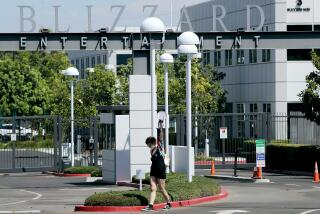Job Cuts Infuriate Lockheed Workers : Labor: Employees say the company didn’t tell them before eliminating 4,500 positions. The firm is moving some operations to Georgia.
Lockheed workers and union officials reacted with anger and confusion Wednesday to the announcement that the company will eliminate as many as 4,500 Southern California jobs and shift several major operations to Marietta, Ga.
Workers said they learned of the decision in news reports Tuesday and added that the company’s explanation to employees Wednesday failed to answer important questions.
For the record:
12:00 a.m. May 31, 1990 For the Record
Los Angeles Times Thursday May 31, 1990 Home Edition Business Part D Page 2 Column 6 Financial Desk 2 inches; 44 words Type of Material: Correction
Lockheed--A May 10 article, “Job Cuts Infuriate Lockheed Workers,” contained incorrect information. Classes on how to find jobs were conducted for Lockheed by Drake Beam Morin Inc., a career management firm. The state Employment Development Office assisted Lockheed employees with a job-matching program.
“They didn’t even have the courage to tell us that they were going to pull out everything to Georgia,” said Frank Williams, a member of the International Assn. of Machinists & Aerospace Workers, which represents about 5,000 workers in Lockheed’s Palmdale, Rye Canyon and Burbank plants.
Union officials directed their attorneys to see if a way can be found to stop the move. They also said attorneys will look into whether the company violated labor laws in the abrupt announcement of its intentions.
Lockheed announced Tuesday that it is moving the headquarters of its Aeronautical Systems Co. from Burbank to Georgia and scrapping plans for a $75-million expansion in its Palmdale facility. The moves are part of a complex effort to reduce costs in the wake of Pentagon budget cuts, it said.
The decision was a departure from plans Lockheed announced earlier. Many Burbank employees had been told that they would be transferred to the Palmdale facility, and some said Wednesday that they have bought houses in the area.
“We knew the move would be gradual and we wouldn’t lose any positions,” said union spokesman Don Nakamoto. “This is something different, when they would wipe out practically everybody. Something of this magnitude had to be in the planning stage for a long period of time. They could have at least given us the courtesy of letting us know about the situation.”
Company spokesman Jim Ragsdale said employees should not have been surprised. “It’s been openly discussed in the past month at least that this was being considered,” he said.
Ragsdale said several thousand Burbank workers will be relocated to Palmdale in the next four years, depending on “how much business there is on the platter.” He said some union members may be transferred to Georgia.
At Lockheed’s Plant 10 facility in Palmdale, some of the 2,100 employees said they feared that the company’s shift means many of them ultimately will be jobless.
“It was very tense. A lot of people were upset,” said a 10-year Lockheed employee who declined to give her name. “A lot of people are concerned about their future.”
Lockheed officials said they expect the company’s work force in Palmdale to increase beyond 2,100 in coming years, mainly because it will become the home of the advanced-development Skunk Works operation now based in Burbank.
Last month, the company announced that 200 of its Palmdale workers would receive layoff notices as part of a broader cutback.
As workers left Lockheed facilities Wednesday, union officials distributed 8,000 copies of a letter written by union President Charlie Brown, which said, in part: “When you stab a loyal worker in the back, ultimately the company will end up the loser.”
Employees noted that two months ago, after Texas billionaire Harold C. Simmons attempted to take over the firm, Lockheed executives had asked workers to wear blue buttons in support of the company.
“Our personal lives are devastated,” said Charlie Hooker, 48. He has worked at Lockheed for 30 years. Hooker’s father also was a Lockheed employee, and four other relatives now work for the aeronautics giant.
“What’s going to happen to us tomorrow?” Hooker asked.
As do his co-workers, 20-year Lockheed veteran Ken Varney sees a bleak future in light of trimmed defense budgets. Varney and others believe that their survival may later depend on jobs at McDonald’s and car washes.
“After I’ve exhausted my job fairs and applications in other aircraft industry (companies), then I have to take a 70% cut in my wages to survive, probably flipping hamburgers,” Varney said.
More than 100 Lockheed employees attended classes, offered by the state unemployment office, on how to find jobs.
Relations between Lockheed and its local unions have not been marked by frequent or bitter strikes in recent years, although the two sides have been at odds over certain issues. For instance, some union officials and production workers had alleged that workers were injured by being exposed to hazardous materials at Lockheed’s Burbank facilities, and federal officials last year cited the company for health violations there.
MAIN STORY, A1
More to Read
Inside the business of entertainment
The Wide Shot brings you news, analysis and insights on everything from streaming wars to production — and what it all means for the future.
You may occasionally receive promotional content from the Los Angeles Times.










